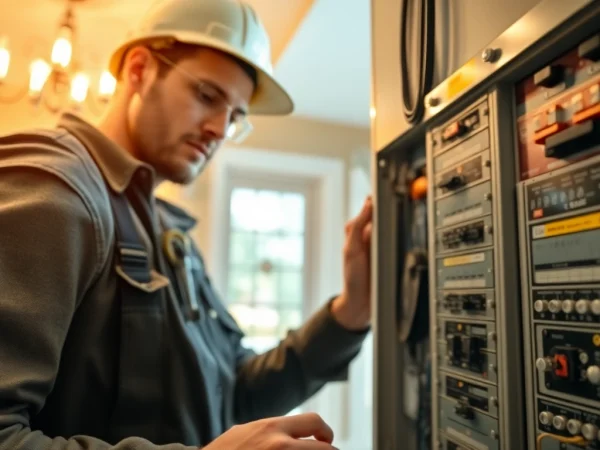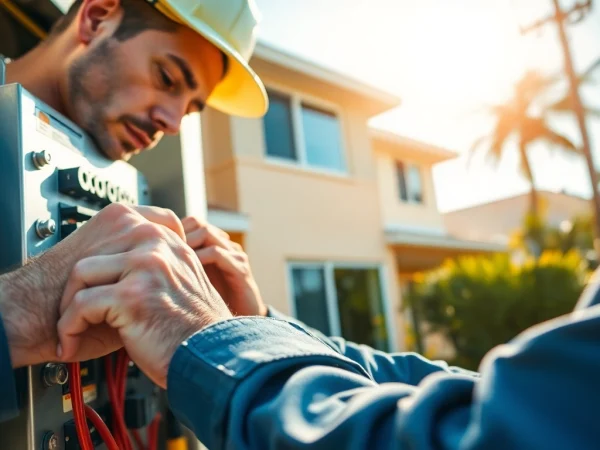Comprehensive Guide to Electrical Panel Services in Clearwater
Understanding Electrical Panels
An electrical panel, often referred to as a breaker panel, is the central hub of your home’s electrical system. It distributes electricity throughout your home and serves as a protection mechanism by preventing overloads. For homeowners in Clearwater, understanding the importance of an electrical panel is crucial for maintaining safety and efficiency. Whether you’re considering an upgrade or simply curious about how your panel functions, the topic of Electrical Panel Clearwater is essential.
What is an Electrical Panel?
An electrical panel is essentially the brain of your home’s electrical system. It receives power from the local utility company and distributes it to various circuits throughout your property. The panel contains circuit breakers or fuses that protect your electrical systems from overload, thus ensuring safety.
Components of an Electrical Panel
Understanding the fundamental components of an electrical panel can help identify any potential issues. Here are the primary elements:
- Bus Bars: Metal bars that distribute electricity to the breakers.
- Breakers: Switches that can stop electricity flow in the event of an overload.
- Neutral Bus: A bar where the neutral wires are connected.
- Ground Bus: A bar that connects the ground wires for safety.
Importance of Electrical Panels in Clearwater
In Clearwater, where humidity and storms can affect electrical systems, having a reliable electrical panel ensures safety and efficiency. An upgraded or modern panel can handle higher electrical loads, which is increasingly necessary as more smart devices fill our homes. Furthermore, compliance with local codes and standards is vital in maintaining your home’s safety and overall value.
Signs You Need an Electrical Panel Upgrade
Lack of attention to your electrical panel can lead to serious safety hazards, including electrical fires and damage to home appliances. Here are several signs indicating that it may be time for an electrical panel upgrade.
Age and Condition of Your Panel
If your home is more than fifteen years old and hasn’t undergone an electrical upgrade, it’s advisable to consider inspecting the panel. Many older panels lack the necessary safety features found in newer models, and deterioration in components is common over time, potentially leading to dangerous scenarios.
Frequent Circuit Breaker Trips
While circuit breakers are designed to trip to protect the system, frequent tripping can indicate that the electrical panel is inadequate for your power demands. If you find yourself resetting breakers regularly, it might be time to upgrade to a more powerful panel to handle your household’s electrical load.
Increased Power Demands
As technology advances, the average household’s electrical demand increases. If you’ve recently added major appliances or devices, your existing electrical panel might struggle to keep up, indicating a necessary upgrade to accommodate these increased loads.
Choosing the Right Electrical Panel for Your Home
When it comes time to select a new electrical panel, navigating your options can seem daunting. Understanding what’s available can ease the decision-making process.
Types of Electrical Panels Available
There are various types of electrical panels that homeowners can choose from:
- Main Breaker Panel: Most common, equipped with a main breaker that shuts off power to the entire home.
- Main Lug Panel: Lacks a main breaker and is used where a separate disconnect is present.
- Subpanels: Used in larger homes to handle additional circuits or specific areas, relieving the main panel load.
Factors to Consider for Clearwater Homes
Homeowners in Clearwater should consider several factors when selecting an electrical panel:
- Local Code Compliance: Ensure that the panel meets local electrical codes.
- Electrical Load: Calculate your current and future electrical needs to choose a panel with adequate capacity.
- Brand Reputation: Select panels from reputable manufacturers that offer warranties and reliable customer support.
Cost Estimates for Different Panels
Costs can vary based on the panel type and installation complexity. Generally, new electrical panels cost between $800 and $3,000, which includes installation. Keep in mind that investing in a quality panel ensures better performance and longevity, potentially saving money in repairs down the line.
Professional Installation and Upgrades
Attempting to install your electrical panel is not recommended if you’re not a licensed electrician. Here’s why professional assistance is crucial.
Why Hire an Expert for Electrical Panel Services?
Hiring a licensed electrician for panel installation brings expertise and ensures compliance with safety standards and local regulations. A professional can help assess your electrical needs accurately and recommend the right type of panel for your home.
Steps to the Installation Process
The following steps are generally part of an electrical panel upgrade process:
- Assessment: An electrician assesses the existing panel and your electrical needs.
- Preparation: The area around the panel is cleared, and the power is turned off.
- Panel Removal: The old panel is safely detached from the electrical system.
- Installation: The new panel is mounted and wired according to electrical codes.
- Testing: The system is tested to ensure that it functions correctly and safely.
Common Mistakes to Avoid During Upgrade
The transition to a new electrical panel can be straightforward, but there are common pitfalls to avoid, such as:
- Neglecting to obtain proper permits.
- Choosing a panel without adequate capacity.
- Failing to verify the credentials of the electrician.
Maintaining Your Electrical Panel Effectively
Once your electrical panel is installed, maintaining it is vital for its longevity and your home’s safety. Regular attention can prevent small issues from escalating into larger problems.
Routine Inspections and Maintenance Tips
Conducting routine inspections will help keep your electrical panel in good condition. Here are some maintenance tips:
- Inspect for signs of wear, rust, or damage regularly.
- Keep the area surrounding the panel clear of obstructions.
- Schedule professional inspections at least once every three years.
Identifying Warning Signs for Early Intervention
Be on the lookout for warning signs that indicate potential issues, such as:
- Burning smells near the panel.
- Discolored or warm panel surfaces.
- Frequent flickering lights.
Long-term Benefits of Regular Maintenance
Investing time and resources into the regular maintenance of your electrical panel yields long-term benefits, including:
- Enhanced safety and reduced fire hazards.
- Extended lifespan of the electrical panel and associated wiring.
- Improved energy efficiency and reduced utility bills.










